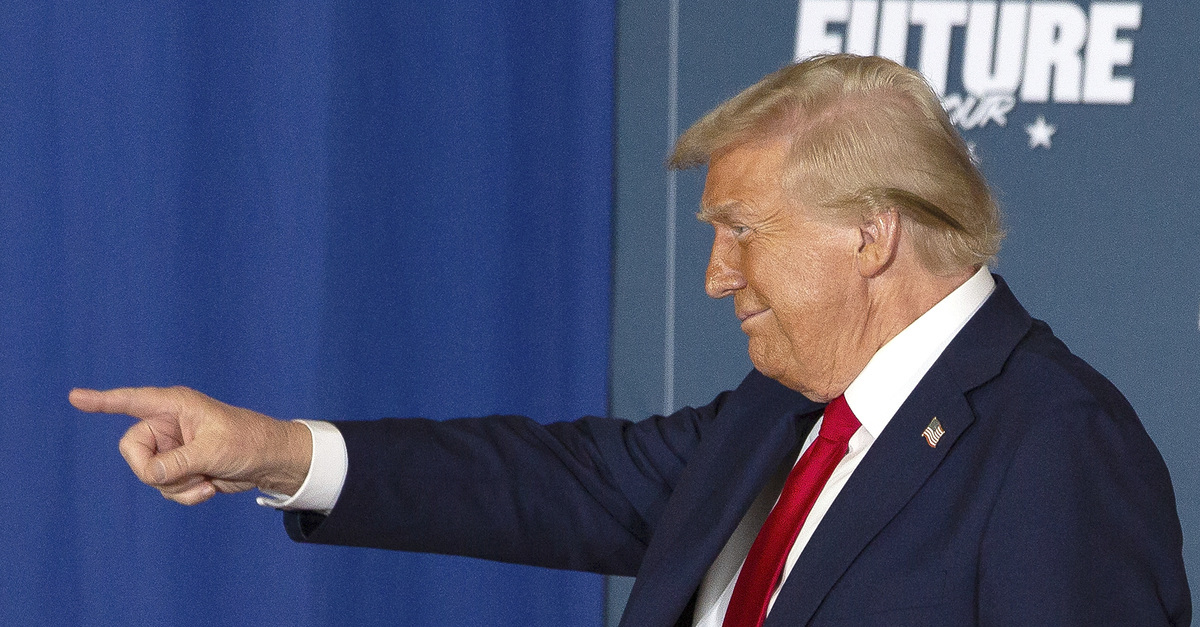
Republican Candidate for President Donald Trump attends the Building America’s Future, Southeastern Pennsylvania Roundtable at the Drexelbrook Event Center on October 29, 2024 in Drexel Hill, Pennsylvania (Matt Bishop/imageSPACE/Sipa USA via AP Images).
President Donald Trump has achieved a significant victory in his legal battle against the Pulitzer Prize Board after a Florida appellate court ruled in his favor on a procedural matter. The decision was made public on Wednesday.
In his lawsuit, Trump sued several individual members of the media awards board — only one of whom is, like him, also a Florida resident.
In January 2024, the out-of-state members of the board sought to have the case against them dismissed for lack of personal jurisdiction, arguing that they had insufficient connection or activity within Florida. However, last summer, the presiding judge rejected this motion.
On appeal, the lower court’s ruling was confirmed.
“The circuit court concluded that the exercise of personal jurisdiction over the eighteen defendants was proper,” the appeals court opinion reads. “We agree. Trump’s operative pleading sufficiently pled that the defendants engaged in a conspiracy to defame him.”
Trump sued the board for defamation in December 2022, after several months of legal demands and threats to file such a lawsuit. The nexus of the lawsuit is the 2018 award for National Reporting which was co-granted to The Washington Post and The New York Times for their reporting on the “Russiagate” scandal. During the 2016 U.S. presidential election, some Russian nationals are alleged to have interfered on the Trump campaign’s behalf — sparking a yearslong search for evidence that the campaign was engaged in a conspiracy with the Russian government. Those allegations, however, never once panned out.
While special counsel Robert Mueller’s inquiries ultimately found no evidence of collusion with the Russian Federation, the two media companies were awarded for what the Pulitzer Prize board referred to as “deeply sourced, relentlessly reported coverage in the public interest that dramatically furthered the nation’s understanding of Russian interference in the 2016 presidential election and its connections to the Trump campaign, the President-elect’s transition team and his eventual administration.”
Unfortunately for the board, that was not all they said about the matter — ultimately responding publicly to Trump’s lawyer letters.
In 2022, the board defended its award with a lengthy statement that stood by the outlets’ reporting. In July 2024, a judge in Okeechobee County, Florida, ruled that the board’s statement was “actionable mixed opinion” and that Trump’s claims were “properly pled.”
The appeals court majority does not discuss the merits of Trump’s lawsuit but cites the board’s 2022 statement in full — reasoning that understanding the process by which the statement was written and issued is necessary in deciding the personal jurisdiction issue.
The full statement reads:
A Statement from the Pulitzer Prize Board
The Pulitzer Prize Board has an established, formal process by which complaints against winning entries are carefully reviewed. In the last three years, the Pulitzer Board has received inquiries, including from former President Donald Trump, about submissions from The New York Times and The Washington Post on Russian interference in the U.S. election and its connections to the Trump campaign — submissions that jointly won the 2018 National Reporting prize.
These inquiries prompted the Pulitzer Board to commission two independent reviews of the work submitted by those organizations to our National Reporting competition. Both reviews were conducted by individuals with no connection to the institutions whose work was under examination, nor any connection to each other. The separate reviews converged in their conclusions: that no passages or headlines, contentions or assertions in any of the winning submissions were discredited by facts that emerged subsequent to the conferral of the prizes. The 2018 Pulitzer Prizes in National Reporting stand.
In the end, the court decided there was enough involvement with Florida to keep the lawsuit moving forward — citing several facts about the process that came up during deposition testimony.
“[T]he defendants issued the website public statement in response to the requests of a Florida resident — Trump,” the opinion continues. “They did so in a meeting attended remotely by a Florida resident who also conducted an editing review of the proposed website statement while in Florida.”
In other words, the board would have been better off simply ignoring the 45th and 47th president’s demands, commentary and questions entirely, the court ruled.
The concurrence spends nearly four pages taking issue with the landmark 1964 U.S. Supreme Court opinion in the case stylized as New York Times v. Sullivan — the source of the “actual malice” standard in defamation law. Actual malice is the most exacting and hardest-to-prove standard. The standard typically becomes operative when the person claiming to be defamed is a public figure.
In order to satisfy the actual malice standard, a plaintiff needs to first convince a judge — and then later try to convince a jury — that the defendant had actually expressed some doubt about the truth of the disputed statements. Secondarily, a plaintiff can plead facts showing a defendant acted with reckless disregard for such veracity.
Artau explains that the upshot of his analysis to “suggest” that the nation’s high court “revisit” whether the actual malice standard “should continue to be the law of the land despite historical evidence showing it does not comport with the original understanding of the First Amendment.”
Still, the jurist concludes, Trump has met the standard.
The concurrence concludes:
The President has met his burden of establishing jurisdiction to proceed with his asserted claims that the non-resident defendants acted with actual malice or reckless disregard for the truth by knowingly conspiring with the Florida resident defendant to defame the President by publishing the statement with “[t]he ultimate purpose of … resurrect[ing] the debunked Russia Collusion Hoax[,]” when, at the time the statement was issued, “it was abundantly clear to anyone interested in the truth that the Russia Collusion Hoax was utter fiction” and “had been contrived and concocted by malicious partisans[.]”
Therefore, the trial court correctly denied the non-resident defendants’ motion to dismiss the President’s claims over the asserted publication of defamatory “FAKE NEWS.”








